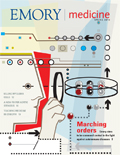Better vaccination through microneedle patch
 |
The H1N1 vaccine administered by microneedle patch gives better protection against the virus than a vaccine administered by subcutaneous injection, researchers from Emory and Georgia Tech have found.
In the study, two groups of mice were 100% protected six weeks after vaccination. Six months later the mice were challenged with the H1N1 virus, and the injected mice had a 60% decrease in antibody protection and extensive lung inflammation compared with the group vaccinated with the microneedle patch.
The patch is a more efficient way to deliver vaccines, researchers say, because the skin contains antigen-presenting cells, including macrophages, Langerhans cells, and dermal dendritic cells, that activate immune-signaling cytokines and chemokines.


